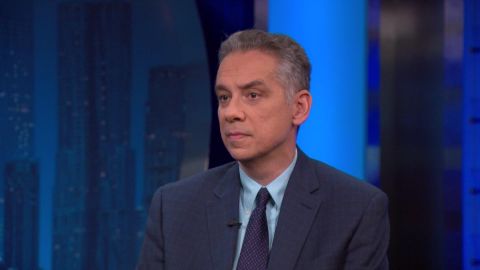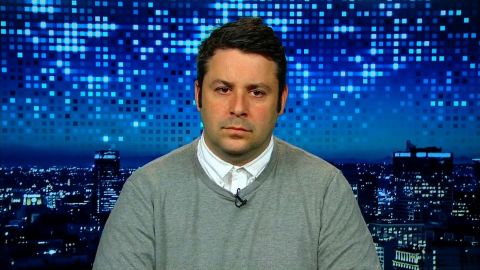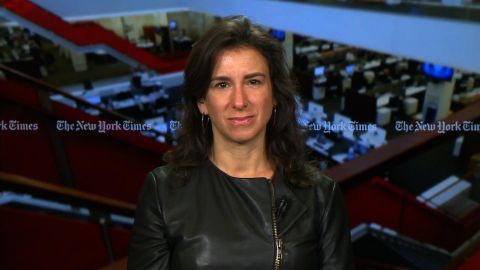Read Transcript EXPAND
CHRISTIANE AMANPOUR: Truth and lies, we have to wrestle with them all the time. The Iranian government continues to grapple with its original lie about the crash of the Ukrainian passenger plane. Today, President Hassan Rouhani pledged to punish those responsible for the downing of that flight. And the government has announced its first arrest. For days, Iran had claimed the plane crashed due to mechanical failure. Ever since admitting that it was shot down, the street has erupted in anger at the country’s leadership. And while Iran may have been forced into coming clean, it is also engaged in a rare instance of accepting responsibility and promising accountability.
This tragedy fits right into the global dilemma of how to live and navigate a post-truth world. And our Michel Martin delves right into that with author Lee McIntyre, a fellow at Boston University.
(BEGIN VIDEOTAPE)
MICHEL MARTIN: You know, I think that most reasonable people will agree that there’s a problem.
LEE MCINTYRE, AUTHOR, “POST-TRUTH”: Yes.
MARTIN: I mean, when you have significant public figures saying things that are manifestly not true or something that is easily disproven, I think most people would acknowledge that that’s a problem, OK?
MCINTYRE: Mm-hmm.
MARTIN: But one of the interesting things about your book is, you say, this is not a new problem…
MCINTYRE: That’s right.
MARTIN: … that you actually trace this phenomenon of what you call post- truth — and we will talk about that in a minute — to the tobacco industry…
MCINTYRE: Yes.
MARTIN: … in wanting to disprove the research around the negative health effects of tobacco. Tell me about that.
MCINTYRE: Yes, so it’s important for people to remember that disinformation has a purpose behind it. It’s to somebody’s incentive to give you that disinformation. And, sometimes, it’s a financial incentive. Sometimes, it’s ideological, political, different sorts of things. Naomi Oreskes and Erik Conway wrote a book called “Merchants of Doubt,” in which they talked about what’s called the Tobacco Strategy, where, in the 1950s, the tobacco companies were sort of hair-on-fire worried about the fact that there was this new scientific study that was going to come out which was going to show an all-but-causal link between cigarette smoking and cancer. And they got together, rented a spot in a hotel, invited in a public relations expert, and talked about, what were they going to do as an industry? They didn’t want to keep fighting over whose cigarettes were healthier. They wanted to come up with a strategy. And the public relations guy told them, you have to fight the science. You have to create doubt. You have to give the public another side to this story, so that this isn’t just something where the scientists are the authority figures, and everybody believes them. And that really created the blueprint for the next 70 years of science denial.
MARTIN: So, what you’re saying is, is that denial of science is closely related to the denial of political facts. Is that what you’re saying?
MCINTYRE: Yes.
MARTIN: That’s really the root of it, in this country at least, you know, because people are familiar with other countries. I remember, in the former Soviet Union, it was almost kind of a — it was an article of faith that the citizens of the Soviet Union knew their official outlets were lying.
MCINTYRE: Yes.
MARTIN: They just didn’t know what the truth was. But it was like everybody was in on the game. What’s different now, though? Is it that some people actually believe this stuff?
MCINTYRE: It’s hard to say. I mean, the — there — I think there are people who believe it. There’s some people who create the disinformation cynically, but you can’t just assume that the person who’s creating it doesn’t also know that it’s true, or doesn’t think that it’s true, because, in a way — I remember reading a terrific book one time called “The Folly of Fools” by Robert Trivers, who’s an evolutionary biologist. And he made the claim that the best way to fool somebody else is first to fool yourself. And so the problem is, when you expose — if you say a falsehood long enough, even to yourself, maybe you begin to believe it. And then it goes on from there.
So, some of the people with science denial, yes, they had maybe an economic motive to start it, and very cynically covered that up. But you you’re absolutely right. I think that there is a straight line that you can draw from the science denial that started with the tobacco industry went through, up to present day, through climate change, anti-vax, evolution, flat earth, all of that science denial, you can draw a straight line between that strategy and today’s post-truth in the political arena.
MARTIN: I was going to ask you about that.
MCINTYRE: Yes.
MARTIN: You call your book “Post-Truth.”
MCINTYRE: Mm-hmm.
MARTIN: What is the difference between post-truth, alternative facts, and just lies?
MCINTYRE: Yes.
MARTIN: What is the difference?
MCINTYRE: Yes, it’s a great question, because people are always wanting to reduce post-truth to something else. How is this not just spin-doctoring? How is this not just lying? Politicians have always lied. And I think that the difference is this. When you’re lying to somebody, you’re — you’re doing a bad thing. You’re intentionally saying something that’s false to try to get them to believe it.
But, in a way, if you — if you think of it in the right way, you’re also at least showing the person the respect of wanting to convince them to get them — to get their cognitive consent to believe what you think is true. With post-truth, they’re not doing that. It’s the audacity of post-truth. It’s the ability to lie with no accountability, because you really don’t care whether the person believes you or not, because you’re so powerful that, just by using the lie, you’re dominating their reality.
That’s what’s so insidious about post-truth and why I think it’s new, because what’s really happening here is, you remember, a politician used to lie or they spin-doctor, they would get caught, and they would at least — there would at least be some mea culpa. Now there’s just — there’s no shame in it. And I think that’s what I define post-truth in the book, it’s the political subordination of reality.
MARTIN: So is this really new? Or you think there’s something particularly insidious about it in the current moment?
MCINTYRE: You bring up a great point. I mean, it’s not — it’s not new in that sense. I think that it’s new in the way that the media and the American voting public are experiencing it now in the 21st century, because maybe we haven’t been aware, with the same social media, with the same attention that everybody’s playing — paying to it.
But, certainly, there have been instances in history where this has happened. And it’s because, if you think about what post-truth — if you think about the point of post-truth, there was a — there’s a historian named Tim Snyder who wrote an important book called “On Tyranny.” And he’s got a sentence in there that I really love. He says, post-truth is pre-fascism. So, the point of post-truth is to get people ready to be dominated, to get them ready to be ruled.
MARTIN: But why are people disposed to believe things that are manifestly not true or that their own experiences might contradict?
MCINTYRE: Yes. It’s because belief is about something more than facts and evidence. Belief is often very tied up — and there’s some empirical work on this. Belief is often very tied up with identity, with values, with trust, even – – and I’m talking here even about empirical truths. I’m talking about things for which there are facts and evidence, not necessarily morality or other — or values or other things that people believe maybe that they got from their family. I’m talking about factual beliefs.
And our belief system these days, I mean, I’m certainly not the first one to say it, is very much based on which — which team you’re with, which group you’re with. And if somebody on your team says something that’s false, maybe — maybe, from the outside, it looks like, well, they’re just going along with that because they want to support the team.
But it might also be because they have been so besotted with this information, that they actually are kind of in that position that Arendt talked about, where they really — fact and fiction, true and false don’t really have any meaning, so I’m going to trust the authority figure from my team.
MARTIN: Do you believe that this tendency to believe what you call post- truth, to believe facts that are convenient to one’s existing point of view, when they’re not facts — again, it’s going to — it may make some people uncomfortable, but do you believe that that behavior attaches to one side more than another in the current moment?
MCINTYRE: There’s been some experimental work on this. So, the analogy that I use when I look at — when I look at science denial, you look at anti-evolution, you look at climate change, those are fairly partisan. But you look at anti-vax, that seems more bipartisan. You — now I’m going to get myself in trouble here. You look at GMOs, that’s even more bipartisan, if not swing left. But there’s been some empirical work on this by a cognitive scientist named Stephan Lewandowsky out of University of Bristol. And he has a new paper out that I just heard him give in which he makes the argument that they all swing right, that all science denial, all conspiracy theory tends to swing right.
MARTIN: But why?
MCINTYRE: I — I don’t know.
MARTIN: Well, I mean, I think — I think that one of the reasons that many people find this so puzzling is that the certain positions that are now under attack and certain professions that are now under attack…
MCINTYRE: Yes.
MARTIN: … are professions that have been highly prized by conservatives, law enforcement, the FBI, diplomats…
MCINTYRE: Yes.
MARTIN: … the military. Many people look at them, and these are some of the people who have been offering testimony…
MCINTYRE: Yes.
MARTIN: … in the current political — in the current impeachment drama. They’re the ones who’ve been saying, something’s wrong here. So, I think it’s a little disconcerting to say, well, how is it possible that, after people — these decorated veterans, people who’ve dedicated their lives to law enforcement are somehow — now they’re wrong? How do you understand that?
MCINTYRE: I just wrote a piece in which I made the argument that — this is based on some experimental work that other folks did, which found that there were five main tropes of science denial, that all science denial was defined by belief in conspiracy theories, cherry-picking evidence, relying on fake experts and denigrating true experts, illogical reasoning, and then insisting that science has to be perfect. You can track — you can map those five tropes exactly onto the strategy that Trump and his supporters are using now against impeachment.
MARTIN: What do you say to those who argue that points of view like yours are inherently elitist? I mean, that is really one of the arguments that Republicans are making at the moment, is that the media is elitist. They think the academy is elitist. And they say that you can — you can keep making these arguments at your peril…
MCINTYRE: Yes.
MARTIN: … because you offend people, and that that — and that offense then breeds even more…
MCINTYRE: Yes.
MARTIN: … even more solidarity of — in belief systems.
MCINTYRE: Yes. I would…
MARTIN: What do you say to that?
MCINTYRE: I would say, to a certain extent, that they’re right, that if we’re going to fight back against post-truth, just in the same way that we’re going to fight back against science denial, the way to do it is not to call people names, not to tell them they’re being illogical or stupid or do those sorts of things. The way that you change someone’s mind is face to face, because that’s how you build trust. That’s how you get somebody to actually believe your evidence.
I will give you an example here. Jim Bridenstine was a kind of rock-ribbed Republican person in Congress. And he gave a speech a few years back against climate change, that — all the things that science deniers say about climate change. And then so, of course, Trump appointed him as the head of NASA. Within months, Bridenstine changed his mind on climate change. So, the evidence didn’t change. The facts didn’t change. What changed his mind is that he started on a daily basis to see in the hallway, to have lunch with, to have conversations with the NASA scientists. So, when those same facts and evidence were presented to him by people that he all of a sudden knew, then he began to change his mind. And so I don’t — I don’t mean push back against post-truth or science denial to be elitist. In fact, one of the things I’m doing in my work on science denial, I’m trying to convince scientists to engage in conversation with science deniers. You can’t just say, well, you’re being irrational and walk away, because then you just get two different silos and nobody’s talking.
The way to convince somebody is to engage with them one on one, grow trust.
MARTIN: OK, but if you’re talking about disinformation a massive scale…
MCINTYRE: Yes.
MARTIN: … how is that supposed to work?
MCINTYRE: I don’t know.
(CROSSTALK)
MCINTYRE: I gave — I gave a talk one time to a corporation. They wanted me to talk about post-truth. First question, the CEO raised his hand, and he says, “Is your solution scalable?” And, I mean, I kind of had to laugh at the jargon, but also then think, well, no, it’s really not, because if I just created a YouTube video or a TED Talk of, you know, what we’re doing now, that’s not necessarily going to convince anyone. After I came back — so I went to the Flat Earth Convention in Denver, Colorado, and I tried to do this one on one. I didn’t get anybody to rip off their lanyard and walk out with me. But I took a guy to dinner, and we talked for two hours. And he was engaging me. I was — I enjoyed our conversation.
What I — what I discovered through that was that, over time, I thought that the strategy could work, but that it wasn’t scalable. And so I wrote a piece in “The American Journal of Physics” called “Calling All Physicists.” I need physicists, I need other people out there doing it. And when with — to come back to post-truth, they always say to us, don’t have — don’t bring up religion or politics at the Thanksgiving table. I think that’s exactly where you change people’s minds. You change people’s minds when they trust you. And who do you trust more, potentially, than family and friends sitting around the Thanksgiving table? If we just retreat into our silos and say, well, I’m right, and the other side says, no, I’m right, it’s going to tear us apart. I think we have to begin to talk again.
MARTIN: I feel like I’d be remiss if I didn’t ask…
MCINTYRE: Sure.
MARTIN: … if the media has played a role in this.
MCINTYRE: I — the sad answer is yes, because, merely by broadcasting a lie, there are some people who are going to believe it, if you don’t put any context in it. The best example I can think of here is the split-screen debates that they used to have with a public health official and then an anti-vaxxer, or that they would have with Jim Hansen, who is maybe the leading voice on doing something about climate change, with a climate change denier. And in the media, one, people don’t want to be accused of bias. And everybody understands that. And one of the easiest ways to show that you’re not bias is to let both sides talk.
But the halfway point between the truth and a lie is still a lie. So, if you have a split-screen debate, where you’re creating in the viewer, the reader, the listener’s mind that there’s — there’s a debate over the consensus on climate change, when there’s really not, and the reason that happened is because you gave voice, you gave a split-screen, you gave — you gave equal time to the person on the other side. That’s what’s called information bias. So, I think that the media has played a part in that. They’re doing a better job now on anti-vax. They’re doing a better job on climate change.
MARTIN: But I want to go back to the political realm…
MCINTYRE: Yes.
MARTIN: … because this is something that came up over and over again during the 2016 campaign.
MCINTYRE: Yes.
MARTIN: You have got a candidate who is saying things…
MCINTYRE: Yes.
MARTIN: …. that are determinately not true or that can be demonstrated to be false. And yet this is a candidate for high office…
MCINTYRE: Yes.
MARTIN: … who has the right to run, who has the right to make an argument.
MCINTYRE: Yes. Yes.
MARTIN: What would you do? What would you do differently?
MCINTYRE: So, I’m well aware of where I am and what I’m about to say…
(LAUGHTER)
MCINTYRE: … which is that, as I say in the book, major media outlets which ran Trump’s rallies in the 2016 election unfiltered, uncut, with no commentary, even when there were lies that were being spread, did — played a role in creating disinformation, played a role in some of the post-truth that we now live with. I think that the important way to deal with that, the better way to deal with that is to report on the lie, but as a lie. There’s a brilliant psychologist named George Lakoff, who has something called the Truth Sandwich. If you’re going to report on a lie, say the truth, say the lie, and then put it in context, say — the other bun, if you will. Say why the person was motivated to do that.
MARTIN: At the end of the day, it does seem to be that we are in a moment where some people want to believe what they want to believe just because they want to believe it. They like how it makes them feel, right?
MCINTYRE: Yes.
MARTIN: Do you feel optimistic or pessimistic? I mean, can this be fixed?
MCINTYRE: I don’t know how to answer that question, except to say that I can’t be pessimistic. I can’t just stand back and let this happen. I’m not optimistic that what I’m doing will be sufficient. I’m — the reason I’m out here, the reason I’m writing, speaking, the reason — I want to get other people to realize that you can fight back. Right now, it’s kind of like the house is on fire, and I have got a cup of water in my hand. And I’m not going to put out the fire with that cup of water, but I refuse to watch it burn. And so what I’m trying to do is to get everybody else with their cups of water to come help me, and maybe we will get a fire hose, and maybe we will put out the fire. That’s what I want. If we despair about post-truth, if we despair — and we just all of a sudden let our politicians begin to lie, and there’s no accountability, then we’re in real trouble I — I’m going to throw my cup of water on the fire, whether it puts out the fire or not.
MARTIN: Lee McIntyre, thanks so much for talking to us.
MCINTYRE: Thank you.
About This Episode EXPAND
Christiane Amanpour speaks with Jodi Kantor and Gretchen Carlson about the Me Too Movement and Harvey Weinstein’s trial; and Oren Falkowitz about preventing hacking around the 2020 election. Michel Martin speaks with Lee McIntyre about the idea of a “post-truth” society,
LEARN MORE



